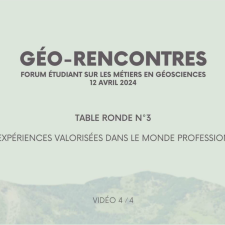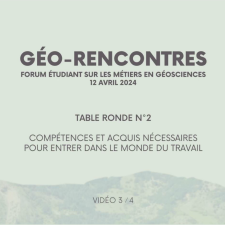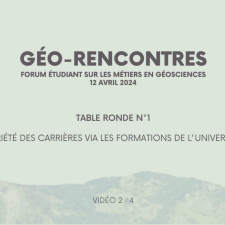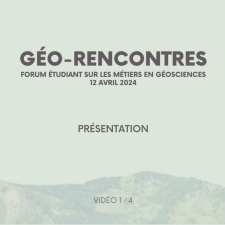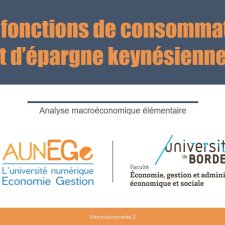Chapitres
Notice
Turning Hazards into Ressources? Climate Change, Floods and Coastal Wetlands in the Costa Brava (North-East Iberian Peninsula)
- document 1 document 2 document 3
- niveau 1 niveau 2 niveau 3
Descriptif
According to the IPCC Fourth Assessment, one of the most vulnerable areas in Europe are coastal zones. This is due to sea level rise combined with increased risks from storms. Coastal wetlands, in particular, are projected to be negatively affected by sea-level rise especially where they are constrained on their landward side, and lack sediment supply. Approximately 20 percent of existing coastal wetlands may disappear by 2080 because of the expansion of the sea. Mediterranean low-lying sedimentary coasts with highly diverse ecosystems appear to be the most vulnerable areas to this phenomenon. The 4th IPCC Report also warns about the increasing likelihood of extreme events such as floods. However, for coastal wetlands (as well as for other ecosystems) floods need not to be considered necessarily a hazard. Rather, they could be seen as an important natural process contributing to groundwater recharge, to the provision of sediment loads to the coastal zone, and, more generally, to the equilibrium between fresh and salt water that, among other factors, make this transition areas so ecologically productive. In this paper we want to present the case study of the “Aiguamolls de l’Empordà” natural park, located in the North of the Costa Brava, to illustrate the possible benefits of larger floods originating from climate change for coastal wetlands. However, for this benefits to materialize it is fundamental to improve adaptation to flooding through a new management philosophy that accepts the axiom of “living with floods” rather than the usual, policy of minimizing or eliminating the hazard though hydraulic control works. Through mechanisms such as land use control, the adaptation of the built environment to flooding and compensatory mechanisms such as insurance, security can be enhances and floods may play a very important role in redressing the effects of sea level rise.
Intervention
Dans la même collection
-
Holocene Climatic Changes and Their Effect on Morphodynamics and Sedimentation in Campania
AmatoVincenzoHigh-resolution paleoclimatic studies (e.g. 18O, 13C, CH4, MS, ect) provide 38 detailed reconstructions of the Holocene climatic variability, but they don’t are unable to provide direct informations
-
Debate
JoussaumeSylviePlantonSergeGonzales RoucoJesus FelipeGoosseHughesReissellAnniBrasseurGuyThe European Science Foundation (ESF) and the French Foundation of the Maison des Sciences de l’Homme (FMSH) (within the Entre-Sciences programme) have agreed to jointly develop a new conference
-
Linking Adaptation and Mitigation for Climate Risk Reduction
ShogrenJason F.How people privately and collectively adapt to climate risk can affect the costs and benefits of public mitigation policy (e.g., Kyoto); an obvious point often neglected in actual policy making.
-
The Effect of Thermal Pollution on Benthic Foraminiferal Assemblages, in the Mediterranean Shore Fa…
ArieliRuthieOver the past several decades public and scientific awareness to global warming has increased significantly. As a result, many studies have examined the affects of global warming. However, the
-
International Negociations on Climate Change: How to Take Advantage of Risk Aversion to Improve the…
ThoronSylvieClimate change is one of the best examples of global environmental problems. Countries are conscious that they have to find a solution to this global problem at the international level. Negotiations
-
IPCC Working Group I
SomervilleRichardThe European Science Foundation (ESF) and the French Foundation of the Maison des Sciences de l’Homme (FMSH) (within the Entre-Sciences programme) have agreed to jointly develop a new conference
-
Conference Opening
GuiotJoëlLauberVolkmarThe European Science Foundation (ESF) and the French Foundation of the Maison des Sciences de l’Homme (FMSH) (within the Entre-Sciences programme) have agreed to jointly develop a new conference
-
From Climate Models to Earth System Models
BrasseurGuyComplex climate models that describe the evolution of the coupled ocean atmosphere cryosphere system are gradually extended to “non physical” components of the earth system, and account for land
-
Are European Ecosystems Vulnerable to Climate Change
CramerWolfgangThe relatively simple question posed by this title turns out to be complicated in its implementation, for a number of reasons: First, ecosystems have changed in response to changing climate throughout
-
The Impacts of Climate Change on Continental Ecosystems
SeguinBernardClimate change will deeply modify the ecophysiological functioningof plants, by creating a set of conditions which could be more favourable (in the sense of biomass production) or not. Among the first
-
Interlocking Natural and Social Systems - Resilience, Governance and Research Policy Considerations
SvedinUnoIn this presentation the start is made from the 2007 IPCC statement that it now seems consolidated that there is a clear sign of the importance of the anthropogenic factors in the climate change
-
Carbon Offsetting: An Ethical and Psychological Approach
FragnièreAugustinThe carbon offset market is becoming more and more popular. However, 57 until now few studies have attempted to approach the phenomenon from a social sciences’ perspective. By distinguishing three
Sur le même thème
-
Géo-Rencontres 2024 / Les expériences valorisées dans le monde professionnel
LilloEmmaAraujoJulieHuartFlorianDubreuRomainBuquetDamienChazalLauraBorieMarianeForum sur les métiers en géosciences organisé par les étudiants du CMI Ingénierie Géologique et Civile, Université de Bordeaux, 12 avril 2024
-
Géo-Rencontres 2024 / Compétences et acquis nécessaires pour entrer dans le monde du travail
BrinonJulietteAmoleFili-FenuaPretouFrédéricCampetHugoLiébauxAlbinDe AlemeidaMarie-LouPoirierAymericDufrenoyAudreyForum sur les métiers en géosciences organisé par les étudiants du CMI Ingénierie Géologique et Civile, Université de Bordeaux, 12 avril 2024
-
Géo-Rencontres 2024 / Variété des carrières via les formations de l'université
InguimbertDianeLacazeRomaneLemaitreLaurieChazalLauraMontjeanPascalPoudevigneJacquesPortefaixFrédéricForum sur les métiers en géosciences organisé par les étudiants du CMI Ingénierie Géologique et Civile, Université de Bordeaux, 12 avril 2024
-
Géo-Rencontres 2024 / Présentation
LatasteJean-FrançoisLavieThéoForum sur les métiers en géosciences organisé par les étudiants du CMI Ingénierie Géologique et Civile, Université de Bordeaux, 12 avril 2024
-
Tokyo, plus grande « ville » au monde : aménager et gouverner la démesure
Languillon-AusselRaphaëlAvec ses quelques trente-cinq millions d’habitants, Tokyo est la « ville » la plus peuplée au monde, et l’une des métropoles les plus riches. Cette présentation vise à décrire, analyser et expliquer,
-
Les fonctions de consommation et d’épargne keynésiennes
Maveyraud-TricoireSamuelLes fonctions de consommation et d’épargne keynésiennes
-
La détermination du PIB à court terme
Maveyraud-TricoireSamuelLa détermination du PIB à court terme
-
Demande en biens et services et fluctuations conjoncturelles
Maveyraud-TricoireSamuelDemande en biens et services et fluctuations conjoncturelles
-
-
-
Les propensions à consommer et à épargner
Maveyraud-TricoireSamuelLes propensions à consommer et à épargner
-
Le marché des biens et services à court terme
Maveyraud-TricoireSamuelLe marché des biens et services à court terme



